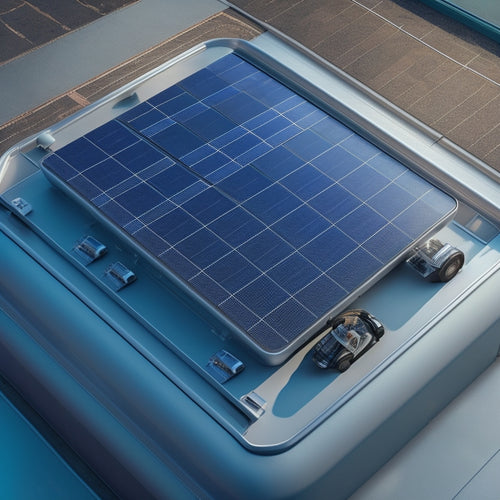
Solar Panel System With Battery Backup Vs Traditional Solar
Share
You're assessing the benefits of a solar panel system with battery backup against traditional solar solutions, and it's essential to understand the differences. Traditional solar systems convert sunlight into power, but without energy storage, you're reliant on the grid. A solar panel system with battery backup, on the other hand, stores excess energy for nighttime or power outages, providing a reliable energy source and reducing your reliance on the grid. This setup optimizes energy usage, reduces energy costs, and promotes a sustainable lifestyle. By understanding the limitations of traditional solar and the benefits of battery backup, you'll be one step closer to achieving true energy independence and reaping the rewards that come with it.
Key Takeaways
- Solar panel systems with battery backup offer energy independence and reliable power during outages, unlike traditional solar systems.
- Traditional solar systems lack energy storage, increasing reliance on the grid and diminishing energy independence.
- Battery backup systems optimize energy usage, reducing energy costs and environmental impact, while traditional solar systems do not.
- The higher upfront cost of solar panel systems with battery backup is offset by long-term energy savings and increased property value.
- Financing options and tax incentives can make solar panel systems with battery backup a more accessible and cost-effective option.
Understanding Solar Panel Systems
As you consider utilizing the power of solar energy, understanding solar panel systems is essential to making an informed decision. Solar technology has evolved considerably, and it's important to grasp the fundamentals of system components to appreciate the benefits of solar energy.
A typical solar panel system consists of several key components: solar panels, an inverter, a mounting system, and a monitoring system. Solar panels convert sunlight into DC power, which is then converted into AC power by the inverter, making it usable in your home.
The mounting system securely fastens the solar panels to your roof, while the monitoring system tracks the system's performance, alerting you to any issues. Understanding how these system components work together is critical to evaluating the performance and efficiency of a solar panel system.
Benefits of Battery Backup Systems
Harness the full potential of your solar panel system by integrating a battery backup system, which can revolutionize your energy independence and provide a safeguard against grid outages.
With a battery backup system, you can store excess energy generated by your solar panels during the day for use at night or during power outages, ensuring you have a reliable source of energy when you need it most. This enhanced resilience means you'll be less reliant on the grid, reducing your environmental impact and saving you money on your energy bills.
Moreover, a battery backup system allows you to optimize your energy usage, using stored energy during peak hours when grid electricity is most expensive. This not only reduces your energy costs but also helps to stabilize the grid during periods of high demand.
By integrating a battery backup system with your solar panel system, you'll be able to maximize your energy independence, reduce your carbon footprint, and enjoy a more sustainable lifestyle.
Traditional Solar Limitations Exposed
While integrating a battery backup system can greatly enhance your solar panel system's performance, it's equally important to understand the limitations of traditional solar panel systems without energy storage.
Without energy storage, you're heavily reliant on the grid, which means your solar efficiency is directly tied to the grid's availability. This grid dependence can lead to reduced energy independence and increased reliance on non-renewable energy sources.
Additionally, traditional solar panel systems often come with installation challenges, such as complex wiring and roofing requirements, which can drive up maintenance costs over time.
Furthermore, the environmental impact of traditional solar panels can be significant, particularly when considering the disposal of decommissioned panels.
Despite technology advancements and market trends favoring renewable energy, traditional solar panel systems still have limitations that can hinder their effectiveness.
Energy Independence With Battery
By integrating a battery backup into your solar panel system, you can break free from the grid's constraints and access true energy independence. This means you'll have a reliable source of power during outages, natural disasters, or peak usage periods when the grid is strained.
With a battery backup, you can store excess energy generated by your solar panels during the day and use it at night or when the grid is down, ensuring energy security for your home or business.
Moreover, a battery backup enhances grid resilience by reducing the strain on the grid during peak hours. This reduces the likelihood of brownouts and blackouts, making the entire grid more stable.
You'll also be able to provide backup power to your community in times of need, promoting a sense of belonging and community. By having control over your energy supply, you'll experience a new level of energy independence, free from the uncertainties of the grid.
With a battery backup, you can rest assured that you'll have power when you need it most.
Cost Comparison and ROI Analysis
Your solar panel system investment is a significant one, and understanding the cost comparison and ROI analysis is vital to making an informed decision.
When considering a solar panel system with battery backup versus traditional solar, it's important to weigh the installation costs, maintenance expenses, and energy savings.
Traditional solar systems typically have lower upfront installation costs. However, they don't provide energy storage, leaving you reliant on the grid during power outages.
Solar panel systems with battery backup, on the other hand, offer energy independence and security, but come with higher installation costs.
Financing options and tax incentives can help offset these costs. Additionally, solar panel systems with battery backup can provide long-term value by reducing your grid dependence and environmental impact.
When calculating ROI, consider the energy savings, increased property value, and potential income from selling excess energy back to the grid.
Frequently Asked Questions
Can I Use My Existing Solar Panel System With a Battery Backup?
You can potentially use your existing solar panel system with a battery backup, but first, you'll need to assess system compatibility and verify seamless battery integration to guarantee efficient energy storage and maximize your ROI.
How Long Does It Take to Install a Solar Panel System With Battery Backup?
It takes a million times longer to wait for the perfect moment than to plunge in - and with a solar panel system with battery backup, you'll be generating clean energy in no time! Typically, the installation timeline spans 2-5 days, depending on the complexity of the installation process.
Are Solar Panel Systems With Battery Backup Eligible for Government Incentives?
You'll be happy to know that you're eligible for government incentives, including tax credits, when you install a solar panel system with a battery backup, as long as it meets the required efficiency and certification standards.
Can I Charge My Electric Vehicle With a Solar Panel System and Battery?
You can charge your EV with a solar panel system and battery, optimizing EV charging with solar efficiency, ensuring a reliable supply from your battery capacity, and achieving energy independence - a perfect blend of sustainability and convenience.
Do Solar Panel Systems With Battery Backup Require More Maintenance?
When you're in the driver's seat, you'll find that solar panel systems with battery backup don't necessarily require more maintenance, but regular checks can help extend battery lifespan; think of it as routine tune-ups to keep your system running like a well-oiled machine.
Conclusion
In the end, a solar panel system with battery backup is like having a reliable captain at the helm of your energy needs. Without it, you're at the mercy of the grid, like a sailboat without a rudder. Consider this: a study by the National Renewable Energy Laboratory found that homes with solar-plus-storage systems can reduce their grid reliance by up to 90%. With a battery backup system, you're in control, steering towards energy independence and significant long-term savings.
Related Posts
-

Top Solar Panels for Car Battery Maintenance
When selecting top solar panels for car battery maintenance, consider high-efficiency models with high wattage output...
-

What You Need to Know About RV Solar Maintenance
When you're out on the road, your RV's solar panel system is your lifeline. But without regular maintenance, you're l...
-

What Are the Average Cost Savings of Solar Panels
You can expect to save between $400 and $1,000 per year on your electricity bills with solar panels, which translates...


